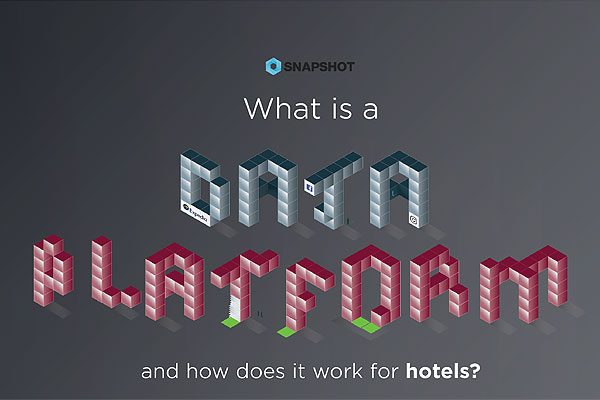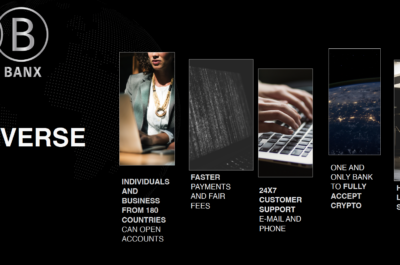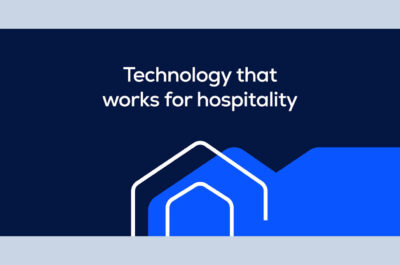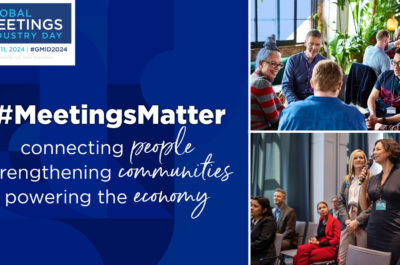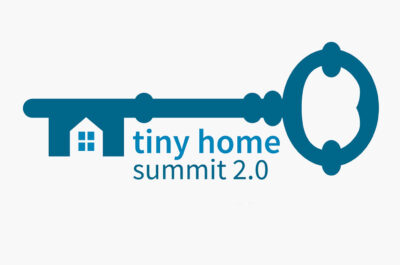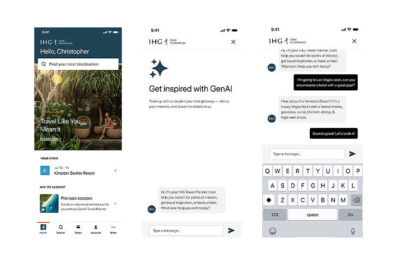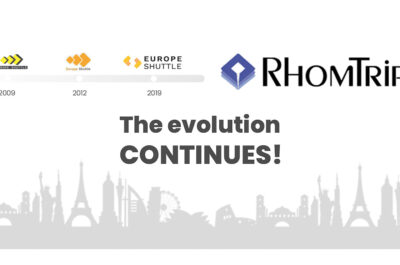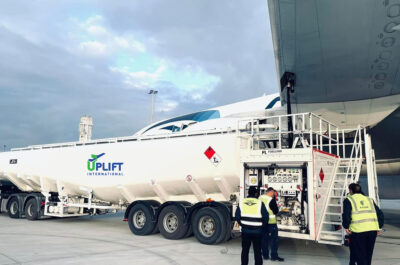A hospitality data platform collects data from multiple systems (PMS, POS, Channel Manager, Website Analytics and much more), harmonizes it into usable and uniform structures, and provides managed APIs and applications to access the data.
With massive amounts of data now available to hotels, it’s safe to say that all future technologies will rely on data and integrations. The need for an independent system to collect and connect all existing data for hotels has become inevitable. Enter the data platform, but what does that mean and how does it work for hotels?
New Call-to-action
Data analytics. Data intelligence. Harmonized data. Big data. We’ve all heard about the endless facets of data, but data is essentially worthless unless it is properly stored, intelligently related to the various parts, and made accessible to users and other systems. Yes, we can see and store the data, but if we don’t understand it, we’re missing out on a world of opportunities, and in turn, profits. Without the technology to bring all data together into one easily accessible location, data becomes this unmanageable monster.
A data platform combines all of the data together from various data sets and acts as a centralized hub where it can be accessed for analysis and integrations. A hospitality data platform collects data from multiple systems (PMS, POS, Channel Manager, Website Analytics and much more), harmonizes it into usable and uniform structures, and provides managed APIs and applications to access the data.
In our last article about data silos, we showed you how data silos are hindering growth in the hospitality industry due to inherit decentralized nature of the hotel and restaurant brick-and-mortar business, the lack of integrations between the numerous hotels, systems and channels we use across the industry worldwide. While all industries are plagued by data silos, the hospitality industry seems to be the least integrated across organizations and we have yet to develop platforms to bring everything together, which is where a data platform comes in.
It might be easier to understand what a data platform is, by describing a bit of what it isn’t. A data platform isn’t just a copy of your existing data onto some servers in the cloud. That would be a backup system or a data lake.
A data platform differs in that when the data enters the platform, it is improved structurally to harmonize it amongst the various data coming in, so it is uniform and comparable when it needs to go out.
For example, in a hotel, one can have multiple ways of naming room categories, which makes it increasingly hard to compare performance of suites, doubles, singles, etc. In a data platform, such information has been harmonized to make it easier to analyze the information.
In other words, a data platform permits multiple hotels or single hotels to access the data rapidly and work with it, without needing to do the relations and harmonizations each time exports are pulled.
How Data Platforms Work in Hospitality
Hotel Data
“Data is vitally important to any modern business, but how you look at your data and what you decide to do with it makes all the difference.” As seen in our “Guide to Hotel Data and Analytics,” data is a fundamental tool to a hotel’s operations and can be broken down into big data, small data, structured data, and unstructured data. Once you understand the different types of data and can distinguish the difference between the various kinds, you can begin to apply your data knowledge to improve your hotel’s performance.

As a hotel, you use many hotel software and systems on a daily basis. You have your hotel revenue management and property management systems, point of sale system, social media platforms, guest reputation websites, online travel agencies, forecast and budgeting tools, marketing platforms, and the list goes on. There is an enormous amount of data your hotel is producing and receiving from the technologies you are using where all of this data is stored in their respective areas.
Add to that hotel groups and chains who have similar data per property. Sometimes these properties use the same systems, sometimes they use different systems based on their location or just because historically they were set up with different systems. Again, all this data needs to be accessible in a uniform manner, so it can be used.
You can start to see why data silos exist and how difficult it is to integrate all of the information into one place.
This is where having a knowledge of the hospitality and travel industry is essential as it permits to effectively work out important data from less important data and relate it correctly when the platform is being built.
Collect the Data
Collecting data is just as important as the data itself. While there are a handful of methods of collecting data, the main ones are:
Individual Connections
Building individual connections to each system for each property. This is arguably the fastest way to collect data. It is also the one that involves the most maintenance since systems change and connections drop, both of which require constant work to keep functioning. Sometimes this even requires on-premise fixes depending on the system being used.
 Building individual connections also collects the data in real time, without moving or copying any data. This is also called a virtual database since it operates in similar way to a database. However, instead of storing the actual data, a virtual database stores the data definitions and knows the location of the data. When information is needed, it sends queries to the locations to then build the database structures data through these queries.
Building individual connections also collects the data in real time, without moving or copying any data. This is also called a virtual database since it operates in similar way to a database. However, instead of storing the actual data, a virtual database stores the data definitions and knows the location of the data. When information is needed, it sends queries to the locations to then build the database structures data through these queries.
For example, when a hotel enterprise stores information for various properties on different servers, a virtual database system accesses the servers through queries to link all remote hotel property data to a centralized document, analytics system, etc.
Data Lakes
Data lakes can be seen as a centralized copy of the data. With data lakes, all the raw data is copied in a central cloud-based location and can be accessed. This is an improvement from having disparate individual connections (virtual database) since all the data is centralized. But it still requires converting the data before it can be used.
Data lakes
 Data lakes are systems that provide access and move data, both structured and unstructured, from various data systems into one system. Simply put, a data lake is a single place where data is stored until needed, where it is then later prepared for use.
Data lakes are systems that provide access and move data, both structured and unstructured, from various data systems into one system. Simply put, a data lake is a single place where data is stored until needed, where it is then later prepared for use.
Data scientists are then able to create customized analytics or other applications through the unstructured data. An example of a software that utilizes data lakes is Amazon Web Services (AWS), which allows hotel enterprises to store both structured and unstructured data from an assortment of sources, including mobile applications, CRM platforms, social media, business software, and more.
If you are familiar with Dropbox, this can be likened to having a Dropbox copy of your raw data. However, it still needs a lot of work before it can be used.
Data Platforms
A data platform is a standardized method of collecting the data wherein the data is harmonized when it enters the platform, so it can be reused with standard definitions and values across multiple properties, data sources and more.
Data platforms go one step beyond by moving the data and then indexing it into the new system. A major benefit of hotel data platforms is that when a hotelier or hotel management company wants to pull any customized data, thanks to the open APIs and data harmonization, this can be done efficiently through standard requests.
In the hospitality industry, there are still no brand or provider agnostic data platforms. The closest we have gotten to such systems is cloud-based PMS platforms that help by providing API access to the data. However, it contains mainly property management system data.
This is where the additional benefit of a hotel data platform comes into play. If a hotel company wants to add review data to their data platform, this is integrated in an industry specific manner and relevant to the rest of the data. Other hospitality enterprises can then benefit and request that their data is also added. Thus, a network effect is created, whereby the entire industry working with different systems can integrate multiple sources of data and have a standardized output.
Harmonizing the Data
Collecting and moving data is an important part of the data journey. However, data platforms now take data one step further. While data lakes store raw data and virtual databases send queries to data silos to collect data, data platforms collect, store, and harmonize data. Harmonization can be a bit tricky as different systems use different names, structures, and semantics.
 Data harmonization takes the differently formatted information and processes it into one cohesive group of data. For instance, in one system rooms may be named “RoomType” versus “RoomCategory” in another database. By harmonizing the data, it can be understood as the same, despite being named differently. Hotel brands could hire a freelancer to come in and manually map data between various systems by changing names and definitions, or simply use a hospitality data platform that will automatically harmonize the data into one system.
Data harmonization takes the differently formatted information and processes it into one cohesive group of data. For instance, in one system rooms may be named “RoomType” versus “RoomCategory” in another database. By harmonizing the data, it can be understood as the same, despite being named differently. Hotel brands could hire a freelancer to come in and manually map data between various systems by changing names and definitions, or simply use a hospitality data platform that will automatically harmonize the data into one system.
The key to understanding your data lies in data harmonization because without it, you would have collected your data with no way of organizing or structuring it.
Analyze the Data
hotel data platform dashboardAnalyzing data can be quite daunting if you don’t know what you’re looking for. Luckily, many property management systems, products, and brands offer some form of data analytics, but then we are faced again with the problem of integrations. Since the industry lacks integrations between many of its technologies, your data, analyzed or not, is once again siloed.
Data analysis relies heavily on data indexing as it focuses on the speed of lookup and data base. Hence, you can see why harmonization is key here. Data platforms allow for indexing to occur on top of the already harmonized data where the more data harmonization that happens, the power of indexing grows. There are several business intelligence tools that can help build great analytics dashboards and go through huge quantities of data. What we have seen when working with many of these is that the biggest hurdle to overcome when building out analytics dashboard and reporting systems is a deep understanding of the data. Breaking down the important from the unimportant data, here we recommend gathering insights from the highly experienced members of your team, alongside designers and data scientists to find ways to express the information clearly.
In Summary
In the hospitality industry, data platforms have become a necessity alongside PMS, Channel Managers and other core systems. We have mostly worked with integrations so far, but deploying integrations across multiple systems is expensive and time consuming. Not only that, there are security issues and standards to be maintained and to add to it. Connection specifications and standards change, meaning they need to be rebuilt frequently.
By moving beyond the integrations “era” and towards proper data platforms that can serve the entire hospitality industry independent of brand or technology providers frees up time and resources to focus on using the data and improving performance.
*Article by SnapShot .
Tatiana is the news coordinator for TravelDailyNews Media Network (traveldailynews.gr, traveldailynews.com and traveldailynews.asia). Her role includes monitoring the hundreds of news sources of TravelDailyNews Media Network and skimming the most important according to our strategy.
She holds a Bachelor's degree in Communication & Mass Media from Panteion University of Political & Social Studies of Athens and she has been editor and editor-in-chief in various economic magazines and newspapers.












